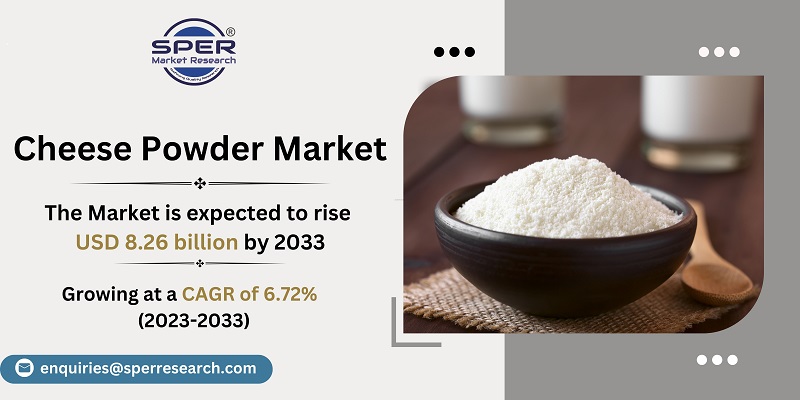
Cheese Powder Market Growth, Size, Trends, Revenue, Sales, Competition and Future Outlook
Cheese Powder Market Size- By Application, By Product Type, By Distribution Channel- Regional Outlook, Competitive Strategies and Segment Forecast to 2032
| Published: Dec-2022 | Report ID: FOOD2234 | Pages: 1 - 228 | Formats*: |
| Category : Food & Beverages | |||
- Kerry Group plc (Ireland) greatly strengthened its dominance in the cheese powder market in September 2022 by acquiring The Kraft Heinz Company's powdered cheese business and related assets. This strategic initiative not only increases Kerry's scale and manufacturing capability, but it also broadens the company's client base in the critical snacking market.
- Fonterra Co-operative Group Limited (New Zealand) has begun a collaborative project to strengthen its US Foodservice business by teaming with Land O'Lakes, Inc. (US), a prominent dairy cooperative in the United States, in October 2022. This strategic sales and marketing arrangement aims to open up new channels for Fonterra's Foodservice services in the vast US market.

| Report Metric | Details |
| Market size available for years | 2019-2032 |
| Base year considered | 2021 |
| Forecast period | 2022-2032 |
| Segments covered | By Application, By Product Type, By Distribution Channel |
| Regions covered | North America, Europe, Asia Pacific, Latin America, Middle East and Africa |
| Companies Covered | Aarkay Food Products Ltd., Ace International LLP, All American Foods Inc., Bluegrass Ingredients Inc., Commercial Creamery Company, DairiConcepts L.P., First Choice Ingredients, Fonterra Co-operative Group, Kanegrade Ltd., Kerry Group PLC, Lactosan A/S, Land O' Lakes Inc., The Archer-Daniels-Midland Company, The Kraft Heinz Company, Wild Flavors Inc. |
- Food Manufacturers
- Food Distributors and Wholesalers
- Retailers
- Snack Food Producers
- Food Ingredient Suppliers
- Food Research and Development Teams
| By Product Type: |
|
| By Distribution Channel: |
|
| By Region: |
|
- Global Cheese Powder Market Size (FY’2022-FY’2032)
- Overview of Global Cheese Powder Market
- Segmentation of Global Cheese Powder Market By Application (Bakery & Confectionery, Dessert, Dips, Dressings, Dry Mix, Flavors, Ready to Eat, Sauces, Snacks, Soup, Sweet & Savory Snacks.)
- Segmentation of Global Cheese Powder Market By Product Type (Cheddar, Parmesan, Mozzarella, Other.)
- Segmentation of Global Cheese Powder Market By Distribution Channel (Super Markets, Hyper Markets, Convenience Stores, Specialty Stores, Others.)
- Statistical Snap of Global Cheese Powder Market
- Expansion Analysis of Global Cheese Powder Market
- Problems and Obstacles in Global Cheese Powder Market
- Competitive Landscape in the Global Cheese Powder Market
- Impact of COVID-19 and Demonetization on Global Cheese Powder Market
- Details on Current Investment in Global Cheese Powder Market
- Competitive Analysis of Global Cheese Powder Market
- Prominent Players in the Global Cheese Powder Market
- SWOT Analysis of Global Cheese Powder Market
- Global Cheese Powder Market Future Outlook and Projections (FY’2022-FY’2032)
- Recommendations from Analyst
1.1. Scope of the report1.2. Market segment analysis
2.1 Research data source
2.1.1 Secondary data2.1.2 Primary data2.1.3 SPER’s internal database2.1.4 Premium insight from KOL’s
2.2 Market size estimation
2.2.1 Top-down and Bottom-up approach
2.3 Data triangulation
4.1. Driver, Restraint, Opportunity and Challenges analysis
4.1.1 Drivers4.1.2 Restraints4.1.3 Opportunities4.1.4 Challenges
4.2. COVID-19 Impacts of the Global Cheese Powder Market
5.1. SWOT analysis
5.1.1 Strengths5.1.2 Weaknesses5.1.3 Opportunities5.1.4 Threats
5.2. PESTEL analysis
5.2.1 Political landscape5.2.2 Economic landscape5.2.3 Social landscape5.2.4 Technological landscape5.2.5 Environmental landscape5.2.6 Legal landscape
5.3. PORTER’S five forces analysis
5.3.1 Bargaining power of suppliers5.3.2 Bargaining power of Buyers5.3.3 Threat of Substitute5.3.4 Threat of new entrant5.3.5 Competitive rivalry
5.4. Heat map analysis
6.1. Bakery & Confectionery6.2. Dessert6.3. Dips6.4. Dressings6.5. Dry Mix6.6. Flavors6.7. Ready to Eat6.8. Sauces6.9. Snacks6.10. Soup6.11. Sweet & Savory Snacks
7.1. Cheddar7.2. Parmesan7.3. Mozzarella7.4. Other
8.1. Super Markets8.2. Hyper Markets8.3. Convenience Stores8.4. Specialty Stores8.5. Others
9.1 North America
9.1.1 United States9.1.2 Canada9.1.3 Mexico
9.2 Europe
9.2.1 Germany9.2.2 United Kingdom9.2.3 France9.2.4 Italy9.2.5 Spain9.2.6 Rest of Europe
9.3 Asia-Pacific
9.3.1 China9.3.2 Japan9.3.3 India9.3.4 Australia9.3.5 South Korea9.3.6 Rest of Asia-Pacific
9.4 South America
9.4.1 Brazil9.4.2 Argentina9.4.3 Rest of South America
9.5 Middle East & Africa
9.5.1 Kingdom of Saudi Arabia9.5.2 United Arab Emirates9.5.3 Rest of Middle East & Africa
10.1.1 Company details10.1.2 Financial outlook10.1.3 Product summary10.1.4 Recent developments
10.2.1 Company details10.2.2 Financial outlook10.2.3 Product summary10.2.4 Recent developments
10.3.1 Company details10.3.2 Financial outlook10.3.3 Product summary10.3.4 Recent developments
10.4.1 Company details10.4.2 Financial outlook10.4.3 Product summary10.4.4 Recent developments
10.5.1 Company details10.5.2 Financial outlook10.5.3 Product summary10.5.4 Recent developments
10.6.1 Company details10.6.2 Financial outlook10.6.3 Product summary10.6.4 Recent developments
10.7.1 Company details10.7.2 Financial outlook10.7.3 Product summary10.7.4 Recent developments
10.8.1 Company details10.8.2 Financial outlook10.8.3 Product summary10.8.4 Recent developments
10.9.1 Company details10.9.2 Financial outlook10.9.3 Product summary10.9.4 Recent developments
10.10.1 Company details10.10.2 Financial outlook10.10.3 Product summary10.10.4 Recent developments
10.11.1 Company details10.11.2 Financial outlook10.11.3 Product summary10.11.4 Recent developments
10.12.1 Company details10.12.2 Financial outlook10.12.3 Product summary10.12.4 Recent developments
10.13.1 Company details10.13.2 Financial outlook10.13.3 Product summary10.13.4 Recent developments
10.14.1 Company details10.14.2 Financial outlook10.14.3 Product summary10.14.4 Recent developments
10.15.1 Company details10.15.2 Financial outlook10.15.3 Product summary10.15.4 Recent developments
SPER Market Research’s methodology uses great emphasis on primary research to ensure that the market intelligence insights are up to date, reliable and accurate. Primary interviews are done with players involved in each phase of a supply chain to analyze the market forecasting. The secondary research method is used to help you fully understand how the future markets and the spending patterns look likes.
The report is based on in-depth qualitative and quantitative analysis of the Product Market. The quantitative analysis involves the application of various projection and sampling techniques. The qualitative analysis involves primary interviews, surveys, and vendor briefings. The data gathered as a result of these processes are validated through experts opinion. Our research methodology entails an ideal mixture of primary and secondary initiatives.



Frequently Asked Questions About This Report
PLACE AN ORDER
Year End Discount
Sample Report
Pre-Purchase Inquiry
NEED CUSTOMIZATION?
Request CustomizationCALL OR EMAIL US
100% Secure Payment






Related Reports
Our Global Clients
Our data-driven insights have influenced the strategy of 200+ reputed companies across the globe.






















